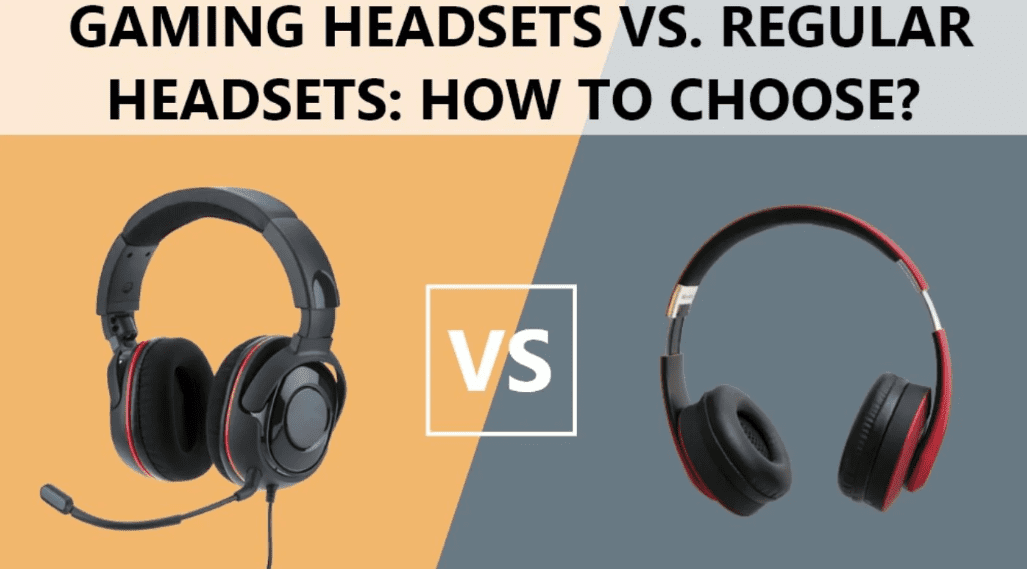No products in the cart.
News
Gaming Headsets vs. Regular Headphones: Key Differences
When it comes to choosing headphones for gaming, you might wonder if a dedicated gaming headset is worth the investment, or if regular headphones can suffice. While both serve the purpose of delivering audio, there are key differences between gaming headsets and regular headphones that can significantly impact your gaming experience. This guide explores those differences, comparing features, sound quality, microphone performance, and design to help you make an informed decision.

Key Differences
1. Microphone
The most obvious difference between gaming headsets and regular headphones is the presence of a microphone. Gaming headsets almost always include a built-in microphone for communication with teammates or other players. These microphones are often designed for clear voice capture and noise cancellation, ensuring your voice is heard clearly even in noisy environments. Regular headphones, on the other hand, typically don’t have a microphone, or may have a basic microphone that’s not optimized for gaming.
2. Surround Sound
Many gaming headsets offer surround sound capabilities, creating a more immersive audio experience by simulating sounds from different directions. This can be particularly beneficial in games where positional audio is crucial, such as first-person shooters or open-world adventures. Regular headphones typically provide stereo sound, which can still be enjoyable for gaming, but may not offer the same level of immersion or positional accuracy.
3. Comfort and Design
Gaming headsets are often designed for extended wear during long gaming sessions. They typically feature comfortable earcups, adjustable headbands, and lightweight designs to minimize fatigue and discomfort. Regular headphones can also be comfortable, but their design may not be optimized for extended gaming use.
4. Sound Quality
While both gaming headsets and regular headphones can deliver good sound quality, their sound profiles may differ. Gaming headsets often prioritize immersive sound with emphasized bass and clear highs, while regular headphones may offer a more balanced or neutral sound signature. The ideal sound profile for gaming depends on personal preference and the type of games you play.
5. Price
Gaming headsets can range in price from budget-friendly to premium, but they are generally more expensive than regular headphones with comparable sound quality. This is because gaming headsets often include additional features like surround sound and a high-quality microphone.
Comparison Table
| Feature | Gaming Headsets | Regular Headphones |
|---|---|---|
| Microphone | Almost always included, often with noise cancellation | May not be included, or may have a basic microphone |
| Surround Sound | Often included for immersive audio | Typically stereo sound |
| Comfort | Designed for extended wear with comfortable earcups and headbands | Can be comfortable, but may not be optimized for long gaming sessions |
| Sound Quality | Often emphasizes immersive sound with strong bass and clear highs | Can offer a more balanced or neutral sound signature |
| Price | Generally more expensive | Generally more affordable |
Which is Right for You?
The best choice between a gaming headset and regular headphones depends on your gaming needs and preferences:
- Choose a gaming headset if: You prioritize clear communication with teammates, immersive surround sound, and comfort for long gaming sessions.
- Choose regular headphones if: You primarily play single-player games, don’t need a microphone, or prefer a more balanced sound signature for both gaming and music listening.
Conclusion
While both gaming headsets and regular headphones can be used for gaming, they offer distinct features and benefits. By understanding the key differences, you can choose the right audio gear to enhance your gaming experience and meet your individual needs.
Do you prefer gaming headsets or regular headphones for gaming? Share your thoughts in the comments below!
Related Articles
- Best Gaming Headsets for PC and Console Gamers
- Best Wireless Gaming Headset for PC with Low Latency and Surround Sound
- How to Choose the Right Headphones
